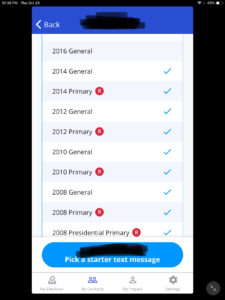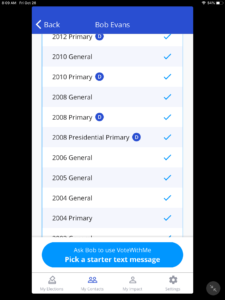While listening to a podcast – Vox’s The Weeds– I heard an advertisement for an app to help you get your friends out to the polls this election, Vote With Me.
The app uses your contact list to search public records and produce for you a snapshot of how diligently your friend attend the polls. Your vote is a matter of public record, who or what you actually cast your ballot for is secret. In addition to knowing if your friends skipped the last midterms the app will also let you know if their district is considered a toss-up or not so you can target your efforts to those area where it will matter the most.
The data goes back to the year 2000 so it can provide an interesting peek into political leanings you may have been unaware of in your friends. Again whom they voted is unknown but if they voted in closed primaries that is public knowledge. I was a little surprised to discover who in my contact list had participated in a Libertarian primary. Here’s a couple of screenshots to give you an example of the type of information you can gleam from this app and very publically available data.
The first is from a friend of mine and I have redacted out their name, even though this is public data without specific consent I’ll keep  their identity under wraps. The second is my own data and so no need of redaction and you can see when I switched my party affiliation.
their identity under wraps. The second is my own data and so no need of redaction and you can see when I switched my party affiliation.
I don’t recall anything like this at all for the last election, though it may have already existed and I simply did not know about it.  Statistician Nate Silver, who founded and runs the data driven news site fivethirtyeight.com, had said that if the polls have a consistent error of 2-3 points biased either for the Democrats of Republicans, then either party could have a strong showing and take both the House and the Senate. I can’t help but wonder what sort effect this app or others like it will have on the election.
Statistician Nate Silver, who founded and runs the data driven news site fivethirtyeight.com, had said that if the polls have a consistent error of 2-3 points biased either for the Democrats of Republicans, then either party could have a strong showing and take both the House and the Senate. I can’t help but wonder what sort effect this app or others like it will have on the election.
This, of course, is only the start of our big data culture. Even those of us who avoid Twitter and Facebook leave a digital trail through the world and the ability to gather, process, and interpret this data is only getting easier.
